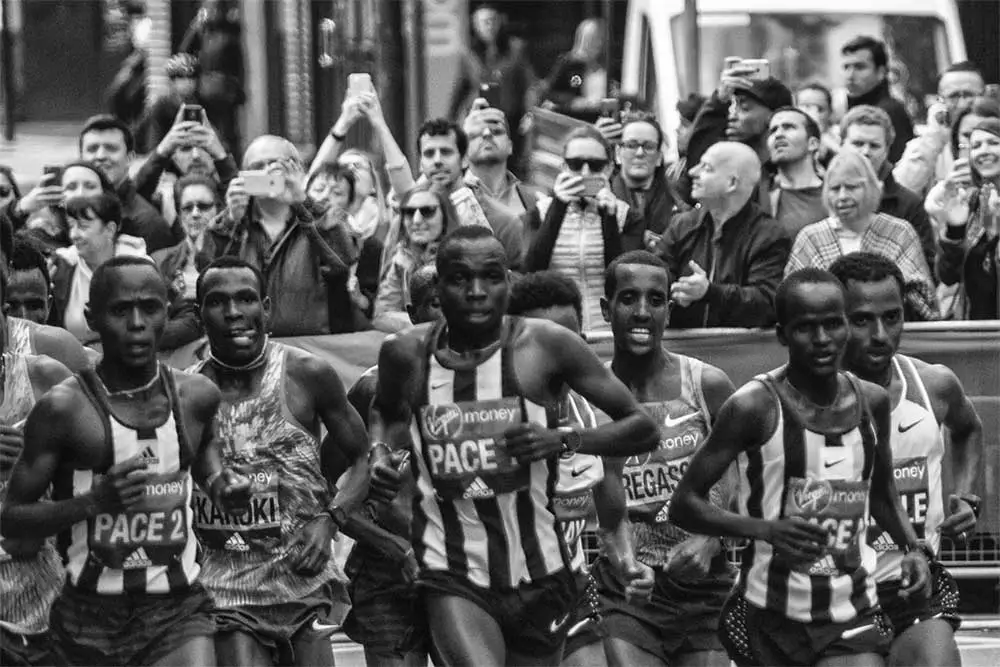Kenyans are an ethnic minority that makes up less than 0.7% of the world population, but despite this, they are the proud leaders of most long-distance races. These kinds of statistics are astounding, especially since Kenya is considered a second-world country meaning they have fewer resources than first-world countries.
You might be wondering, how do they do it?
Do they have a cultural advantage, a genetic edge, or has this country got just plain lucky when it comes to producing champions?
These kinds of questions are popular, but as you start to look into the research or explanations, the answers and theories get complicated. There is a nasty history around white and Western scientists studying, judging, and valuing the physical and cultural attributes of Africans.
Before we look into why Kenyans are so fast, we need to appreciate the horrible histories of the recent past and give respect to all the cultures mentioned in this article.

For example, popular writing from Western communities has suggested that Kenyan’s run fast because of the cultural difference in transport. The idea being that Kenyans would run several miles to school every day and so would have been trained from a young age at long-distance running. This simply isn’t true.
When researchers John Bale and Joe Sang actually decided to ask Kenyans about their running habits, 14 of the 20 kids in their survey said they walked or took a bus to school. This is very similar to a Western School system.
That study was very small, but it showed how Western imaginations had manipulated our perceptions of Kenyan culture. The truth is, it is hard to explain Kenyan’s success without seeming like you are explaining away their achievements.
Every athlete tries hard to earn their medals, but questions and research like this belittles the effort and skills these athletes have. Kenyan Olympic gold medal winner Kip Keino has condemned a 2000 study, that suggested that Kenyans had a physical advantage to running, as racist. He stated, “There’s nothing in this world unless you work hard to reach where you are, and so I think running is mental”.
The study in question came from the 2000 Danish Sports Science Institute. It compared Kalenjin boys to Thomas Nolan, a Danish track star. The study concluded that Kalenjins had a higher number of red blood cells and “bird-like legs” making running less energy-intensive.
In 1990, the Copenhagen Muscle Research Centre compared Kenya post-pubescent schoolboys to professional Swedish runners and found that the Kenyans consistently outperformed the professional Swedish Runners.
With all this in mind, we cannot ignore the importance of physicality. Sport is a physical discipline, and so physical advantages can help athletes reach their goals. If you are taller, you are more likely to do well in basketball, and if you have a long wingspan, then you’ll do well in swimming competitions.
However, none of this matters if you don’t have the drive, focus, and enthusiasm for the sport you are in. As Kip Keino said, “running is mental” you could be born with the perfect genes for running, but if your head isn’t in the race then you would never reach that potential.
What do Kenyan Runners eat?
A typical diet for a Kenyan runner is simple and natural. A great diet for a runner should contain carbohydrate-rich foods like bread, rice, and pasta, along with plenty of fruits and vegetables.
The carbohydrates give you energy, and the fruits and vegetables help against inflammatory issues, like muscle soreness. The next important food type you need is protein, like meat and eggs. This helps your body build your muscles and repair them from damage.
Professional marathoner, Justin Lagat comes from Kenya and has said that most elite Kenyan runners eat Ugali, green vegetables, milk, beans, and eggs. He goes on to explain that this is a typical Kenyan meal eaten since childhood. Ugali is a dough made from maize flour and tastes like popcorn.
Justin says that the preparation of his food is kept natural, like boiling or pan-frying. As this is mostly carbohydrates and vegetables, it is unsurprising that such a great athlete is eating so well!
Do Kenyan runners lift weights?
Most Kenyans don’t lift weights, generally speaking. They instead do track work, interval training, and run up hills.
Hugo van den Broek, the Head Coach for the Kenya Experience running camp in Kenya, explains that he doesn’t see the point in lifting weights as it doesn’t specifically add to your running abilities. He suggests simply running uphill to give your legs the power it needs in your marathons.
If you are wondering if you should bother with weight training, ask yourself if you can gain the benefits elsewhere? If there aren’t many hills near you or even long places to run, weight training could boost your muscles strength in a smaller space.
- How Many Calories Do You Burn Running a Marathon? - May 13, 2021
- Should You Run On An Empty Stomach? - May 12, 2021
- Which Exercise Is Best for Lungs? - May 11, 2021
